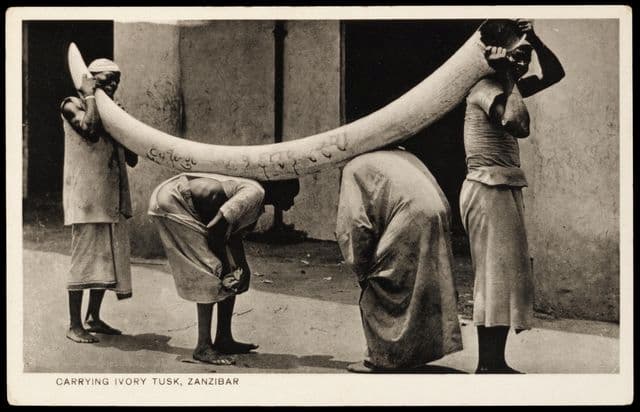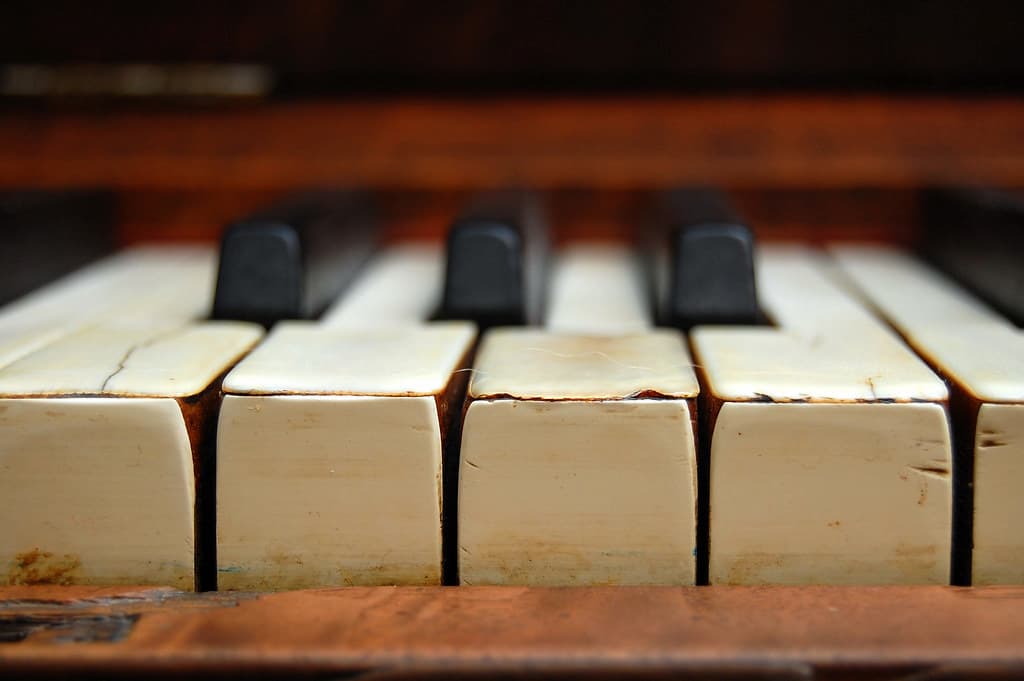Have you ever wondered where the phrase “tickling the ivories” comes from? Is it just a colloquialism, or is it meant literally? Is making piano keys out of ivory legal? And is ivory the preferred material for piano-builders today? If not, why not?
Today, we’re answering questions about ivory piano keys that every piano player should know.
What is ivory?

Ivory tusks
First things first: what exactly is ivory?
Ivory is an animal product that comes from mammals’ teeth or tusks, most often elephant tusks.
Ivory is made up of a bony tissue called dentine and covered with enamel that makes the tusks extremely hard.
Elephants rely on tusks to interact with the world around them. Tusks help them to manipulate objects, fight other animals, and protect their trunks. They are necessary to an elephant’s ability to survive in the wild.
Elephant tusks are embedded in their skulls. The only practicable way to harvest ivory from an elephant tusk is to kill the animal and remove it.
How did ivory come into vogue in piano building?
When the piano was first invented, its keys were made entirely of wood.
Eventually, as the instrument evolved and became more popular, and as repertoire became more demanding, pianists began pondering the suitability of other materials.
Around the same time, in 1799, a Connecticut silversmith and inventor named Phineas Pratt patented a machine that automated the process of cutting teeth into ivory combs.
This technology advanced quickly, enabling factories to make all kinds of things out of ivory, including piano keys. Ivory-topped piano keys looked better than completely wooden ones and were far more durable.
Ships would arrive in Connecticut with the tusks of elephants that had been slaughtered in Africa. American companies then carve them into thin wafers and bleach them in the sun before sending them to piano manufacturers.
A company named Comstock, Cheney & Co. built an entire company town in Connecticut for its workers! Not surprisingly, they named it Ivoryton.
Aren’t there moral objections to the ivory trade?

Of course, the most obvious tragedy of the ivory trade is that it requires the slaughter of elephants.
Elephants are not only magnificent creatures; they are also vitally important to the biodiversity of the areas in which they live.
They use their tusks to dig for water during dry seasons, which makes water available to other smaller and physically weaker species. They also distribute seeds in their dung, ensuring the health of ecosystems. Killing elephants imbalances these vital natural processes.
However, elephants aren’t the only victims; the ivory trade also had an unimaginable human cost, as well.
Forces hired by wealthy slavers would often capture the people of an African village, enslave them, and bring them to ports for transport to other parts of the world.
During their difficult, dangerous journeys to the ports, many people were forced to carry extremely heavy tusks. Many people died during the journey.
Ivory’s Historical Connection to the Slave Trade | National Geographic
So why was ivory used for piano keys?
Despite its grisly origins, ivory was still extremely appealing to piano-builders and players. It was aesthetically pleasing, as mentioned above, and more durable than wood alone.
In addition, many pianists appreciated the keys’ distinctive texture. If your hands are sweating, ivory keys can help keep your fingers from slipping.
That said, the material has its downsides, too. Ivory is porous, which leads to discoloration and means that ivory keys will need more frequent cleanings.
Ivory keys are also susceptible to cracking and other damage.
Do piano makers still use ivory today?
No. Recognizing ivory’s downsides, piano manufacturers began experimenting with plastic keytops in the 1950s.
Later, in 1975, Asian elephants were placed on an endangered species list, leading to the ban of the international trade of their ivory. In 1989 the trade of ivory originating with African elephants was also banned.
After the first ivory ban in the 1970s, all piano manufacturers began using plastic for keytops instead of ivory.
It wasn’t a tremendous loss. Plastic keys have noteworthy advantages over ivory ones: they’re very durable, they won’t yellow, they come in exactly uniform sizes, and they’re easier to clean.
Are any piano manufacturers attempting to imitate ivory?

Ivory keys
Yes! The Yamaha piano company has experimented with a kind of plastic that mimics ivory by including some mineral components. Yamaha calls this material “ivorite.”
(Kawaii has also experimented with using similar substances.)
The jury’s still out as to whether these are objectively better than other keys. In the end, it really comes down to personal preference.
How can I tell if my piano’s keys are ivory or plastic?
The first step would be to judge the year of the piano. If you know, for instance, that it’s a hundred years old, and that the keys haven’t been replaced, then they’re likely ivory.
If you don’t have the faintest idea about the piano’s date of creation, take a close look at the keys. Molded plastic keys come in one part. Ivory keys, however, often have a tiny but noticeable seam. You can find the seam by stroking a finger down a black key toward you until you hit the white key. Now look to the side of your finger; that’s where an ivory key seam might be. (Unfortunately, this test isn’t foolproof, because some high-end ivory keys were also manufactured in one part, but it’s at least a start.)
You can also look for a fingerprint-like texture on the keys and assess their yellowness. Ivory, being a natural material, will be more prone to those traits.
After taking all of these things into consideration, hopefully you’ll be able to tell what you have. Here’s more information:
Are ivory keys worth anything?
Short answer: they’re worth nothing because ivory cannot be sold.
Longer answer from an expert:
Conclusion
Despite the omnipotence of ivory keys in nineteenth-century piano building, humanity has decided that no new piano needs ivory keys. Today we’re lucky to have solid alternatives.
That said, many people are also concerned about the use of plastics in piano building from a sustainability perspective…but that’s a discussion topic for another day!
For more of the best in classical music, sign up for our E-Newsletter



